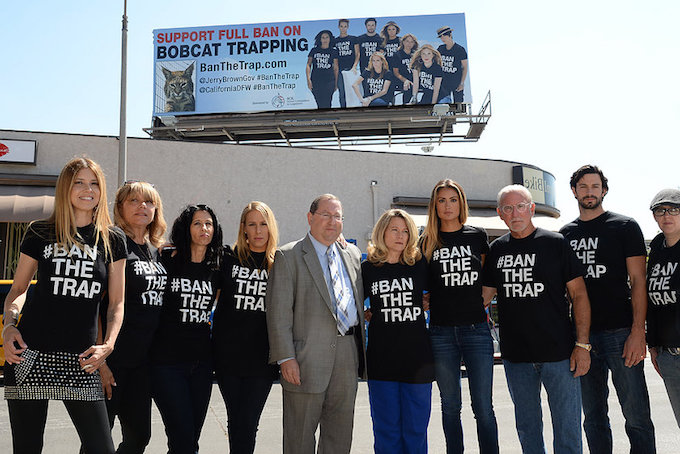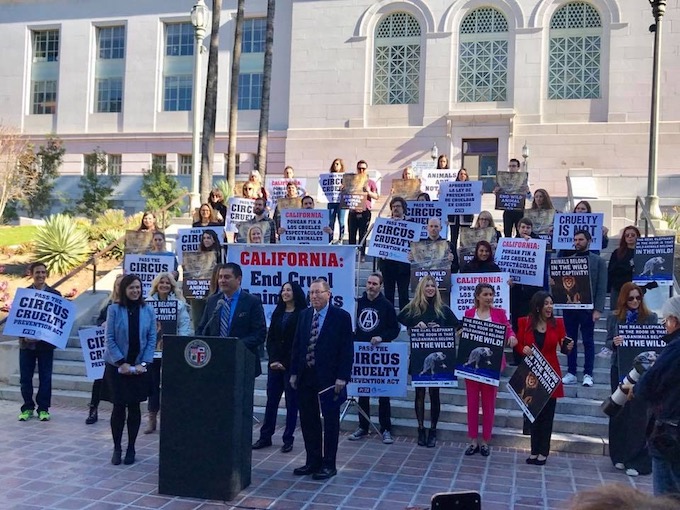
Laguna Beach resident Judie Mancuso has worked tirelessly to get legislation passed to protect creatures great and small.
By Diane Krieger
Few Californians know her name, but any Sacramento insider can tell you who Judie Mancuso is: She’s the Mother Jones of quadrupeds, the force behind an animal-protection revolution sweeping the Golden State.
The Laguna Beach resident—who, on the local level, is vice chair of the city’s Environmental Sustainability Committee—has led the fight to abolish puppy mills (Assembly Bill 485) and outlaw pets being left unattended in hot cars (Senate Bill 1806). She’s behind the ban on animal exploitation in circuses (SB 313) and the mandatory microchipping of all shelter animals (SB 573).
And her successes in California are spilling over state lines and making inroads at the federal level, too. After her triumph with California’s Dining with Dogs bill (AB 1965) in 2014, Mancuso ushered similar legislation through New York. A California law she sponsored mandating plant-based meal options in prisons and hospitals (SB 1138) is also now the law in New York.
Mancuso, 58, is the founder of Social Compassion in Legislation, a nonprofit dedicated to saving and protecting animals in the wild, on farms and in people’s homes through public policy advocacy.
Since 2006, the activist has sponsored 54 state bills—18 of which have been signed into law. She’s derailed countless others that, if passed, would have harmed animals. She has locked horns with powerful special interests like the meat industry, egg producers, the National Rifle Association and luxury brands like Estee Lauder and Louis Vuitton, as well as associations representing some of the world’s largest corporations such as Procter & Gamble and Unilever.
“Judie has repeatedly beaten all of them,” says her longtime ally, philanthropist and retired orthopedic surgeon Gary Michelson, who has financially backed many of Mancuso’s legislative campaigns. “She’s the one responsible for ending fur trapping (AB 273) in California. … She also laid the political groundwork in Sacramento, which led to the end of fur sales in the state. … The world is changed as a result of one individual.”
Normalizing Animal Rights
Over the past 15 years, Mancuso has dramatically moved the needle on what’s considered ethical or acceptable behavior toward animals. And, as the saying goes, what California does today, the nation will do tomorrow.
The Cruelty-Free Cosmetics Act (SB 1249) that Mancuso sponsored in 2018 has inspired similar laws in Nevada, Illinois,Virginia, Maryland and Maine, with more in the pipeline in other states. Changes in federal regulations are currently underway with HR 5141, the Humane Cosmetics Act, which was introduced in the House of Representatives in 2019 and is awaiting a committee hearing.
Mancuso’s legislative wins are tipping the scales internationally, too. Six months after SB 1249 eliminated the massive loophole for American cosmetics brands to continue wide-scale animal testing for export markets in compliance with Chinese “safety” standards, China voluntarily lifted some of those requirements.Then, in 2019, with AB 1260, Mancuso added several mammal and reptile species to a list of animals that are not allowed to be sold in the state. Since then, many high-profile designers, such as Mulberry, Calvin Klein and Tommy Hilfiger are swearing off exotic skins.
It is impossible to overstate the impact that Mancuso is making, according to Michelson. “California leads the nation and the world, and Judie leads California,” says the billionaire animal welfare activist.
For the first decade, she worked alone for no pay. “It isn’t even a case of the tail wagging the dog,” Michelson says. “She was a flea on the tip of the dog’s tail.” And yet, he says, “She’s the most effective person in all of California. There’s no question.”

A Natural-Born Organizer
Mancuso’s empathy for animals goes back to early childhood. She remembers the day she discovered where hamburgers came from. Her dad had pulled up alongside a tractor-trailer packed tight with cows. “Where are they going?” she asked. “To the slaughterhouse,” her parents bluntly told her, “so you can have your hamburger.” Gazing into a cow’s eyes, she recoiled.
At 25, she read John Robbins’ “Diet for a New America” and stopped eating meat. She gave up fish and seafood after learning about dolphins trapped in fishing nets. Cream for her lattes was the last thing to go: At 30, she switched to soy and went vegan. “It was very liberating,” Mancuso says.
It pains her to feed meat to Petula, Twiggy, Linus, Lily, Bella and Malia—her two shelter dogs and four rescue cats. “I give them as much vegan food as they’ll eat, but they’re not vegan. I wish I could get them there. I hate buying the stuff,” she says, referring to meat-based pet food.
Mancuso grew up in a working-class Italian family in St. Louis. Her dad was a truck driver, her mom a homemaker and shopkeeper. The youngest of four, she was an organizer by nature. Mancuso was the kind of kid who started a petition that got the mean teacher removed from playground duty. Rebellious and outspoken, she dropped out of school at 15 and went to work retail and front desk jobs. Bored, she enrolled in community college in the 1980s and earned a degree in data processing. She rode the first wave of the personal computing tsunami, succeeding in a man’s world as a programmer and, later, a business systems project manager at Toshiba and E-Trade.
In her social life, Mancuso surrounded herself with animal activists. She married a graphic interface designer who shared her zeal for animals and her disinterest in raising children. Periodically, she would dive headlong into emergency rescue work. She was one of the first to show up at a shelter run by the Federal Emergency Management Agency outside of New Orleans where thousands of abandoned pets were housed after Hurricane Katrina. When she learned that a San Diego cat rescue was being shut down for animal neglect violations and 120 feral felines were slated for euthanasia, Mancuso swooped in. She negotiated a month’s stay of execution, rapidly raised money for the facility’s cleanup, recruited veterinarians to donate their services, and managed the logistics of getting every last cat adopted or placed with rescue organizations.
In 2003, Mancuso’s then-husband encouraged her to step off the corporate treadmill and devote her full energy to animal welfare work. Rather than rescuing pets a hundred at a time, however, she resolved to “go in big.”
“You can try to change hearts and minds,” she explains, “but at the end of the day, changing the law gets it done.” She started shuttling between Laguna Beach and Sacramento, learning the ropes of legislative maneuvering from seasoned politicians who were sympathetic to the cause.
She remembers her first hearing, in support of a 2003 bill banning the use of dogs in bear hunting (AB 342). Invited by author Paul Koretz, who was then a state assemblyman, Mancuso naively arrived with five other animal activists. The opposition brought busloads of burly men in camouflage and orange vests.
“Those were the bad old days when the animal activists were disorganized,” recalls Koretz, now an LA City Councilman.
When the bill was presented, more than 400 angry hunters rose to their feet, crossed their arms and glared at the lawmakers throughout the testimony. At times, they actually growled. The bill went down in flames.
Koretz authored six animal welfare bills before he was termed out in 2006. Most lawmakers in Sacramento quit after just one. “Anything with special interests opposed was just dead on arrival,” Koretz says. He laments that Mancuso didn’t arrive on the Sacramento scene sooner. “She is this force of nature,” he says.

What’s Her Secret?
Mancuso’s right-hand man, Nickolaus Sackett, explains that the key to her success is her single-mindedness.
“She lives and breathes animal protection,” says Sackett, SCIL’s director of legislative affairs. “Her whole life, 24 hours a day, revolves around this work. Everything else she puts on the back burner.”
The last few years have been wildly productive. In 2018, SCIL sponsored six bills—three passed into law. In 2019, volume nearly doubled with 11 bills—three passed, three were defeated by veto and the rest were either tabled or died in committee. Eleven bills were also in the pipeline during 2020, but eight got shelved due to COVID-19 constraints. Currently, SCIL has several active campaigns in progress: one regulating pet breeding; two protecting biodiversity and endangered sea life; and two promoting plant-based meals at schools and smart climate agriculture. Two bills, AB 1282, allowing a community blood bank system for pets, and AB 416, restricting the purchase of materials from tropical deforestation areas, were recently approved and sent to the governor’s desk.
That level of productivity is unprecedented in the world of animal rights advocacy, according to Sackett. “Bigger animal organizations will say, ‘Judie, don’t do this bill. There’s no chance it gets passed. Just wait until we can all back you in some future year, when it’s the right time.’ And she would just go ahead and introduce the bill and get it passed,” Koretz says.
Michelson describes her as incorruptible, tenacious and immune to intimidation. In 2010, when Japan, Iceland and Norway maneuvered to undo an international moratorium on whaling, Mancuso and Michelson produced a 30-second commercial in which friend, actor and animal advocate Pierce Brosnan called on then-President Obama “to honor your [campaign] promise” to end illegal whaling. After the spot aired, the Obama administration changed course and opposed those countries’ efforts.
Mancuso has also been on a multiyear campaign to pass a law requiring pets be sterilized. After seeing the bill watered down, amended a dozen times, renamed and then soundly rejected, it remains on her to-do list. But Mancuso doesn’t give up.
“If you want to get something big done,” she says, “you’ve got to be willing to stay in it and fight.”




